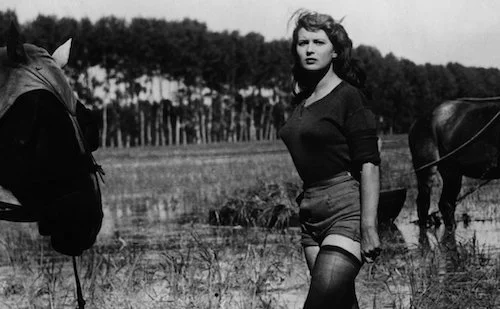The World of Movies: Bitter Rice
Written by Rachael Crawley
The World of Movies is a series that explores global cinema, drawing on films from many countries, industries and eras. This week, we’re watching an Italian neorealist melodrama (is that contradictory?) in the northern agricultural industry.
Bitter Rice.
May contain spoilers.
We’ve gone as far back as 1918 in this column, and as recently as 2020, but one decade is still missing – the 1940s. Obviously, there were good reasons for filmmaking to be reduced around the world in the first half of the decade. In the aftermath of the war, some of Italy’s finest filmmakers began to explore innovative forms of storytelling – and it is here that we turn to Giuseppe de Santis’s Bitter Rice (1949).
The film begins with a reporter explaining that rice is farmed in northern Italy, primarily by women. We are shown the chaos of the early harvest season. In the midst of the crowds, small-time criminals Walter (Vittorio Grassman) and Francesca (Doris Dowling/voice of Andreina Pagnani) try to make an escape. Francesca looks for work in the rice fields, but as an “unofficial” worker, she joins with others in her situation to fight for a place. After a while, under the strain of difficult conditions and unscrupulous bosses, tension develops between the two groups. And then Walter returns with a new scheme in mind…
Bitter Rice.
So this movie straddles an uneasy line – while it takes many tropes of neorealism, it also indulges in a lot of over-the-top aspects more common in Hollywood. The crime story could be from a gangster film a decade earlier, while the many sensual dance scenes could easily come from an Elvis beach party a few years down the line. Still, there is a vein of social commentary typical to neorealism – in particular some barbed moments about gender roles of the era – and it does not shy away from showing the gritty reality of the workers’ lives. It has been suggested that the less “down-to-earth” moments are more of a parody of Hollywood styles. In the end, though? It’s quite an interesting mix. By taking elements from these two worlds, the film comes off as very appealing while still maintaining its seriousness.
Technically, the film shines most strongly in its cinematography. Some of its images, such as a long shot of the rice harvest or a particular tracking shot of the women in a train, are breathtaking. The performances are generally quite able, but one standout is Silvana Mangano (voice Lydia Simoneschi) as the seasoned worker Silvana. Alternately strong-willed, saucy, and vulnerable, her character feels the most fully realized of the group.
And so this film is part potboiler, part social drama, and it manages to effectively blend both sides. In its portrayal of workers struggling for fair treatment, and its depiction of women facing extra hurdles in the working world, it definitely resonates to a modern viewer. In addition, the plot is compelling enough that the film (mostly) manages to stay away from straight didacticism. On the level of simple enjoyment, and of connecting to real issues, Bitter Rice is a great choice for film fans.
Rachael Crawley holds a Master's Degree in Film and Photography Preservation and Collections Management from Ryerson University, and has worked with film in Canada and in Europe. She adores language and cinema, and how these subjects interact with each other.




